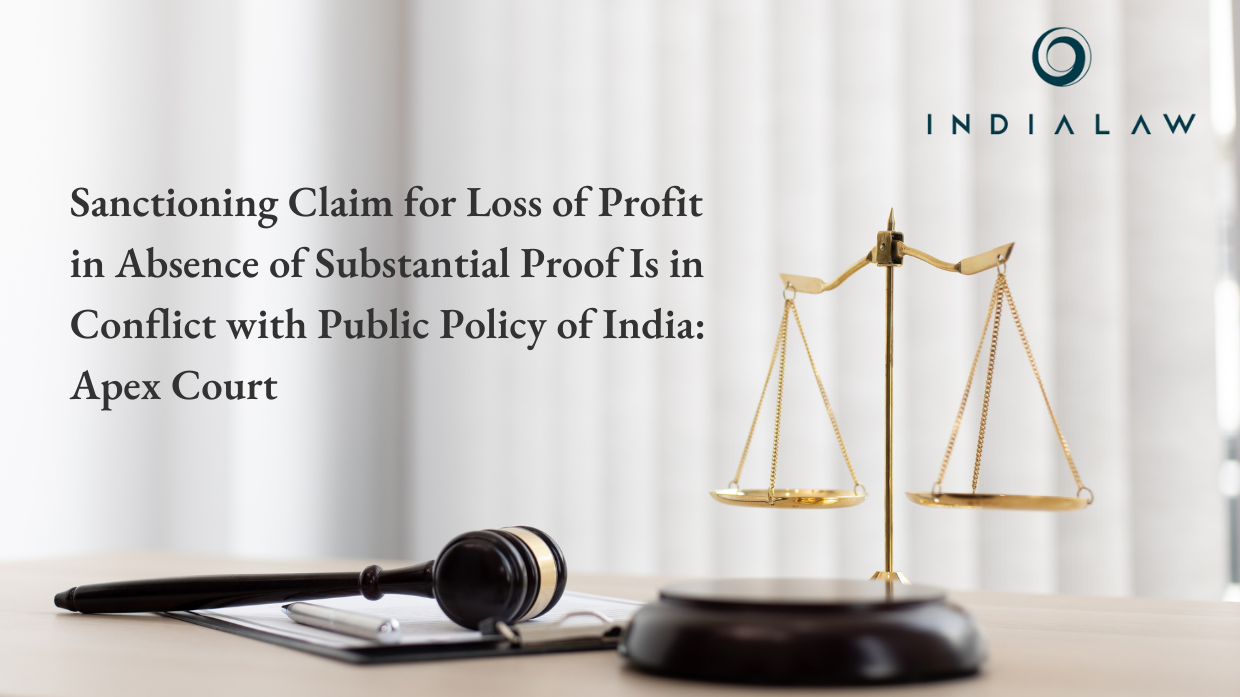Sanctioning Claim for Loss of Profit in Absence of Substantial Proof Is in Conflict with Public Policy of India: Apex Court

Introduction
In the context of interpreting an award deemed to be patently illegal and conflicting with public policy, the Supreme Court in M/s. Unibros v. All India Radio[1], clarified that a claim for loss of profit cannot be unquestionably granted in absence of substantial evidence to corroborate the actual loss of profit. It is essential to provide material to support, for loss of profit claims.
Section 34(2)(b)(ii) of the Arbitration and Conciliation Act, 1996, (“Arbitration Act”) states that if a Court finds that an Arbitral Award conflicts with the public policy of India, then the same may be set aside.
The matter was heard by the Division Bench of the Supreme Court comprising of Justice S. Ravindra Bhat and Justice Dipankar Datta.
Table of Contents
Facts of the case
In the instant case, the claimant, All India Radio, awarded a contract to the respondent, M/S Unibros, to carry out construction of Delhi Doordarshan Bhawan, Mandi House, at New Delhi. The work was scheduled to commence on 12th April 1990 and reach completion on 11th April 1991; however, it suffered a delay of roughly 42½ months and was finally completed on 30th October 1994. Due to the delay, a dispute arose between the two which was subsequently referred to a Sole Arbitrator. The Arbitrator had twice ruled in favor of the claimant regarding their compensation claim, for loss of profit.
Rounds of Litigation
In the first award,compensation was awarded to the claimant for loss of profit by the Arbitrator. It was undisputed that there was a delay in completing the assigned tasks within the agreed upon timeframe as stated in the contract. That the stipulated contract period was of 12 months and since the respondent took additional 3½ years in completion of the work, this led to the loss of profit to the claimant during the said time.
Being aggrieved by the said award, the respondent filed a petition u/s 34 of the Arbitration Act before the High Court. The first arbitral award was set aside by the High Court and the claims of the claimant were remitted to the Arbitrator for re-consideration and to pass a fresh award.
In the second award, it wasobserved by the Arbitrator that there was a failure on the respondent’s part to provide the complete site and drawings within the stipulated timeline that caused delays. The Arbitrator hence maintained the arbitral award for loss of profit and interest to the claimant.
The respondent once again filed a petition u/s 34 of the Arbitration Act challenging the second Award. The High Court allowed the objections that were raised u/s 34 and the award was set aside as it lacked sufficient evidence to establish the loss of profit.
M/s. Unibros being aggrieved by the decision of the High Court, approached the Supreme Court of India.
Observations of the Supreme Court
It was observed by the Court that the Single Judge remitted the claim for reconsideration and categorically stated that the Arbitrator must not be influenced by the factors that were considered while passing the First Award and that the award was to be passed based on material on record, however, the Arbitrator ignored the decision of the High Court while passing the second award.
Claim for Loss of Profit
While considering the claim for loss of profit of the claimant, it was observed by the Supreme Court that delay in completing the work within the stipulated timeline or a missed opportunity to the claimant due to the delay, becomes imperative to substantiate the presence of a viable opportunity through satisfactory material on record. It was further clarified by the Court that the evidence must be convincing, and it must demonstrate that had the contract been executed promptly, then the claimant could have attained huge profits by utilizing the existing resources in another place.
It was added by the Supreme Court that pertaining to claims related to loss of profit, or missed opportunities to succeed, one must fulfil the following:
- That there was a delay in completing the contract;
- The same was non-attributable to the claimant;
- The claimant is an established contractor who has been handling substantial projects; and
- Sufficient evidence/ material substantiating the claim of loss of profitability.
Decision of the Supreme Court
The Supreme Court held that “A claim for damages, whether general or special, cannot as a matter of course result in an award without proof of the claimant having suffered injury. The arbitral award in question, in our opinion, is patently illegal in that it is based on no evidence and is, thus, outrightly perverse; therefore, again, it conflicts with the “public policy of India” as contemplated by section 34(2)(b) of the Act.”
What would constitute “public policy of India” has been lucidly explained by the Supreme Court in ONGC Ltd. vs. Saw Pipes Ltd.[i], it was clarified by the Court that the concept of public policy connotes some matters which concern the public good and the public interest. That what constitutes public good or what is in public interest or injurious or harmful to the public good or public interest would vary from time to time. However, an award that is patently in violation of statutory provision is not in the public interest. It is likely to adversely affect the administration of justice and hence against the public policy.
That the concept of “public policy of India” includes but not limited to compliance with fundamental policy of the nation’s laws, statutes and judicial precedents, adopting a judicial approach, compliance with natural justice, patent illegality and Wednesbury unreasonableness.
The Supreme Court held that the second arbitral award is not better than the first award and the same conflicts with the public policy of India. The factors considered by the Arbitrator in the arbitral awards are identical. The Supreme Court stated that a lower court must accept a binding judicial decision from a higher court.
It was held that on perusal of record it is evident that the last condition, i.e., sufficient evidence/ material substantiating the claim of loss of profitability is absent in the present case and thus Appeal was dismissed.
[1]SLP (Civil) No. 8791/2020:
[i] (2003) 5 SCC 705.
By entering the email address you agree to our Privacy Policy.



